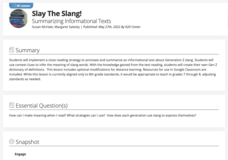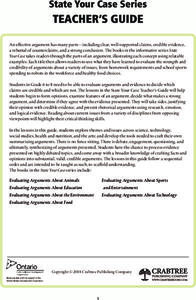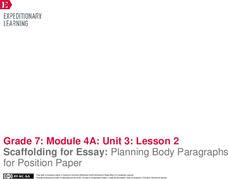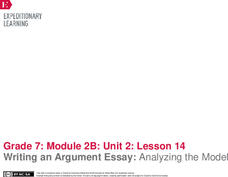Core Knowledge Foundation
Unit 3: Strange Case of Dr. Jekyll and Mr. Hyde by Robert Louis Stevenson Teacher Guide
New ReviewThe Core Knowledge Foundation offers this teacher guide to Robert Louis Stevenson's gothic novel about the duality of humankind. The 128-page guide includes a unit introduction, unit calendar, nine scripted lesson plans, assessments with...
K20 LEARN
Slay the Slang! Summarizing Informational Texts
Middle schoolers get hip to the jive with a lesson about slang. They closely examine examples of slang and use context clues to infer the meaning of the terms. Groups read and summarize an article about a teacher who created a Gen Z...
K20 LEARN
Is Pizza Epic? Word Choice
Remember when everything was Fantastic! Fabulous! Awesome! Iconic! A series of activities encourages young writers to move beyond these overused descriptors and instead choose a more precise language.
Global Oneness Project
The Importance of Indigenous Language Revitalization
Middle schoolers consider languages as representations of cultures and the importance of preserving various languages, especially the rapidly disappearing languages of indigenous peoples, in a lesson that tells the story of Marie Wilcox...
Curated OER
Putting it Together: Analyzing and Producing Persuasive Text
Young orators demonstrate what they have learned about persuasion and persuasive devices throughout the unit by analyzing a persuasive speech and then crafting their persuasive essays. Class members engage in a role-play exercise, use...
Curated OER
How Will We Create a Future without Waste?
Many young people act globally by reducing, reusing, and recycling, Now they take it to the next level by upcycling. Middle schoolers design a proposal to eliminate waste by exploring the new material cycle and applying their knowledge...
K20 LEARN
A Way With Words: Copy Editing And The Writing Process
Learning to edit copy using correct grammar and mechanics is an essential skill in school—where scholars are called upon to edit their peers' writing—and in business. Class members practice this skill by first editing a provided article...
Angel Island Immigration Station Foundation
Culminating Writing Project - Reporting on Angel Island
The unit study of Angel Island Immigration Station concludes with scholars using information from the previous lessons to craft a news story about the Angel Island program.
Crabtree Publishing
State Your Case Series
Four lessons make up a unit focused on writing persuasive essays. Each unit builds on the last, ultimately taking pupils through the writing process. Scholars make a claim, create an argument, debate both sides, then state their opinion....
EngageNY
Mid-Unit 3 Assessment: Drafting the Position Paper
Organize your thoughts! Scholars work on the drafts of their position papers about sustainable water management. The draft serves as their mid-unit assessment. Before beginning, the class discusses the prompt and then learners work...
EngageNY
Forming a Research-Based Claim: Stakeholder Chart on Better Agricultural Water Management
How can industries manage water more sustainably? Building on the previous activity, scholars explore the topic by creating a stakeholder chart for agricultural water management. Next, they participate in the World Café discussion...
EngageNY
Forming a Research-Based Claim: Stakeholder Chart on Better Industrial Water Management
It's time to stake a claim! Working with partners, scholars create stakeholder charts for better industrial management of water. As they complete the chart, pupils consider an option for managing water more sustainably, identify...
EngageNY
Forming a Research-Based Claim: Cascading Consequences Charts
Life is all about choices and consequences. Using a Cascading Consequences chart, scholars create a visual map of the effects of a particular choice or action related to water management. With their researcher's notebooks and copies of...
EngageNY
Scaffolding for Essay: Planning Body Paragraphs for Position Paper
Let's make a plan. Scholars work on the plan for their papers using a Position Paper Planner. They talk with a partner about counterclaims and think about counterclaims to include in their papers. As learners begin to write, they work...
EngageNY
Choosing a Position: Screen Time and Adolescents
Time to pick a side! Building on the Fishbowl activity from the previous instructional activity, scholars choose a position about whether the American Academy of Pediatrics should raise its screen time recommendations. Using notes,...
EngageNY
End of Unit 2 Assessment, Parts 1A and 1B: Fishbowl on Screen Time and Adolescents
Here's a surefire way to ensure that class discussions go swimmingly! Using the resource, scholars participate in a Fishbowl activity, forming two concentric circles in the classroom. As the group on the inside of the fishbowl discusses...
EngageNY
Forming a Research-Based Claim: Analyzing Risks and Benefits for Stakeholder
Welcome to the World Café, where lively debate is on the menu! Scholars participate in the World Café protocol, moving between discussion groups to decide if the American Academy of Pediatrics should increase its adolescent screen time...
EngageNY
Forming a Research-Based Claim: Introducing Stakeholders and Consequences
Consequences, consequences. Using the resource, scholars engage in a class discussion about the repercussions of too much screen time. Next, they create a Cascading Consequences chart that lists the positive and negative effects of...
EngageNY
Mid-Unit Assessment: Drafting the Position Paper
Halftime! Scholars write the rough draft of their position papers to serve as the mid-unit assessment. At the end of the sessions, pupils turn in their rough draft essays and work on independent reading.
EngageNY
Forming a Research-Based Claim: Comparing Cascading Consequences
It's time to weigh the risks and benefits of screen time! Pupils work in triads to identify the strongest positive and negative consequences from their Cascading Consequences chart. Next, using the chart and their researcher's notebooks,...
Thoughtful Learning
Using Perspective Shifting to Persuade Readers
One of the key competencies of social and emotional learning is social awareness and being able to see things from another's perspective. This ability to shift perspective is particularly important when crafting an argument to persuade...
EngageNY
End of Unit 2 Assessment, Part 1: Drafting the Essay
Young writers use the class time to complete a draft argumentative essay. In answer to the Pygmalion end-of-unit prompt they discuss the change seen in Eliza's inner identity.
EngageNY
Writing the Argument Essay: Moving from Planner to Drafting
It's an easy transition. Scholars identify transition words in the Pygmalion model essay and record definitions in the Transitions anchor chart. They then begin to look at the tone of the model essay. Finally, individuals begin writing...
EngageNY
Writing an Argument Essay: Analyzing the Model
Class members analyze the model essay to determine the given claim and the evidence to support it. They use an Analyzing Evidence in the Model Essay sheet to help guide their work. They then begin to analyze the structure of the essay by...

























